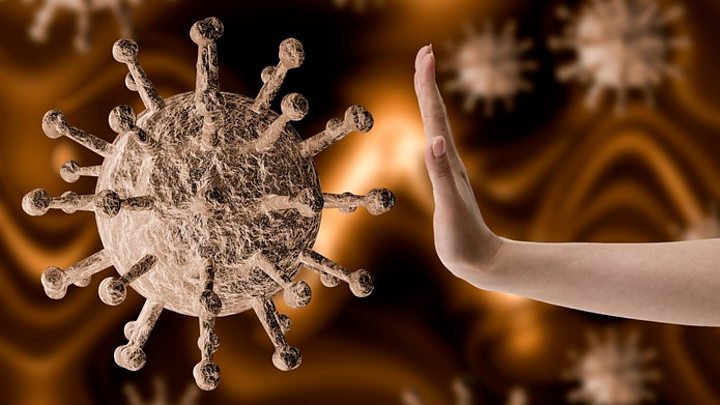Coronavirus: UK ‘well prepared’ to deal with cases, says government
The UK is “well prepared” to deal with coronavirus cases and the risk to individuals “remains low”, the government has said.
Downing Street said 99% of those tested in the UK had come back negative.
The total number of cases in the UK has risen to 13 after four cruise ship passengers flown back to Britain on Saturday tested positive for the virus.
It comes amid growing fears the outbreak could reach pandemic scale as more cases emerge around the world.
A total of 6,536 coronavirus tests have been conducted in the UK as of 14:00 GMT on Monday, with 6,527 returning as negative, the Department of Health said.
Italy has the largest number of coronavirus cases in Europe, currently 165, and has reported its fifth death from the virus.
It has taken tough measures to try and contain the outbreak, including enforcing a lockdown in several small towns in the Lombardy and Veneto regions.
- Four new UK coronavirus cases among ship evacuees
- Coronavirus spread raises fears of pandemic
- Irish warned not to visit Italy amid virus fears
Asked whether similar measures could be imposed in the UK, the prime minister’s official spokesman said: “We will be led by the advice from public health and medical experts and will take steps which they feel are required to best protect the British public.”
The risk to individuals “remains low” and 99% of those tested in the UK had come back negative, the spokesman added.
He said: “We are well prepared for UK cases, we are using tried and tested procedures to prevent further spread and the NHS is extremely well prepared and used to managing infections.”
The government will continue to “work closely” with the World Health Organization and international partners, and “remain prepared for all eventualities”, he said.
So far, the Department of Health and Public Health England have taken a number of measures to deal with the outbreak, which include:
- The NHS putting specialist teams in every ambulance service and some hospital units
- Coronavirus diagnostic tests being rolled out to laboratories across the UK, to allow more than 1,000 people a day to be tested
- The Foreign Office carrying out “enhanced monitoring” of direct flights from nine countries: China, Thailand, Japan, South Korea, Hong Kong, Taiwan, Singapore, Malaysia and Macau
- New legal powers being issued to allow the government to keep people suspected of having the virus in isolation
The Foreign Office updated its travel advice for Italy over the weekend, the spokesman added.

Ireland’s Department of Foreign Affairs has advised its citizens not to travel to affected areas of Italy.
Meanwhile, rugby matches in Italy involving Welsh club Ospreys and Irish side Ulster have been postponed due to restrictions enforced by officials dealing with the outbreak in Italy.
Plans are being made to reschedule both fixtures, which were due to take place on Saturday.
The UK has supplied equipment including facemasks to China to help combat the spread of the disease, the spokesman confirmed.
“We have supplied [the Chinese government] with 1,800 goggles, 430,000 disposable gloves, 194,000 sanitising wipes, 37,500 medical gowns and 2,500 facemasks,” he said.
What you need to know about coronavirus
What are the symptoms?
The main signs of infection are fever (high temperature) and a cough as well as shortness of breath and breathing difficulties.
What should I do?
Frequent handwashing with soap or gel, avoiding close contact with people who are ill and not touching your eyes, nose and mouth with unwashed hands can help cut the risk of infection.
Catching coughs and sneezes in a tissue, binning it and washing your hands can minimise the risk of spreading disease.
Anyone experiencing symptoms, even if mild, after travelling from mainland China, Thailand, Japan, Republic of Korea, Hong Kong, Taiwan, Singapore, Malaysia or Macau, is advised to stay indoors and call the NHS 111 phone service.
What is the government doing?
The main focus is on rapidly identifying people with the disease and taking them to specialist hospitals for treatment in isolation.
They are then tracing anybody who has come into close contact with the patient to make sure they know the signs of the disease and what to do.
The total number of UK cases has risen to 13 after four cruise ship passengers flown to Britain on Saturday tested positive for the virus.
They were among 30 repatriated Britons and two Irish citizens beginning a 14-day quarantine at Arrowe Park Hospital in Wirral.
The four UK nationals caught the virus on the Diamond Princess liner in Japan and are being treated in specialist NHS infection centres.
Separately, four Britons from the ship who recently tested positive for the new coronavirus were not on Saturday’s repatriation flight.
They included David and Sally Abel, from Northamptonshire, who have since been diagnosed with pneumonia, according to their family and are being treated in a Japanese hospital.
Elsewhere, countries including South Korea, Italy and Iran are battling to contain the virus, which causes respiratory disease Covid-19.
About 77,000 people in China, where the virus emerged last year, have been infected and nearly 2,600 have died.
More than 1,200 cases have been confirmed in about 30 other countries and there have been more than 20 deaths.